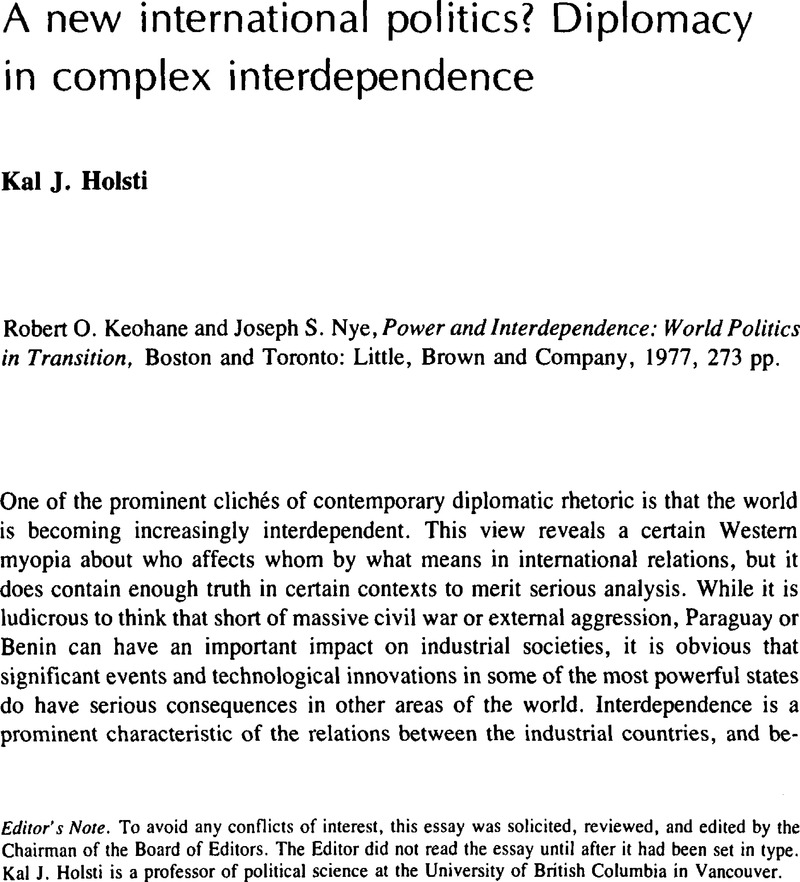Published online by Cambridge University Press: 22 May 2009

1 There are many versions of dependency theory. Various writers emphasize different facets of the problem, and use different arenas for investigation. It is not the purpose of this essay to present a comprehensive review of the vast literature on the subject. For a critical analysis of many of the main propositions in this body of literature, see Cohen, Benjamin, The Question of Imperialism (New York: Basic Books, 1973)CrossRefGoogle Scholar. For refinements and attempts to operationalize some of the key concepts in the dependency literature, see Travis, Tom, “Toward a Comparative Study of Imperialism,” paper presented to the 16th Annual Meeting of the International Studies Association, Washington, D.C., 02 1975Google Scholar, and Kurth, James and Rosen, Steven, eds., Testing Economic Theories of Imperialism (Lexington, Mass.: Lexington Books, 1974)Google Scholar.
2 I select these two authors primarily because of the comprehensive character of their analysis. While Frank's theses apply primarily to the Latin American experience, it is clear that he is writing about all Third World countries. Galtung's model of center-periphery relations is also universal in its application. See Frank, André Gunder, Latin America: Underdevelopment or Revolution (New York: Monthly Review Press, 1969)Google ScholarPubMed, esp. Chapter 1. Galtung, Johan, “A Structural Theory of Imperialism,” Journal of Peace Research No. 2 (1971): 81–117CrossRefGoogle Scholar.
3 Moran, Theodore, Multinational Corporations and the Politics of Dependence (Princeton: Princeton University Press, 1974)Google Scholar.
4 Weak States in a World of Powers (New York: The Free Press, 1972)Google Scholar.
5 A good review of the debate is in Rosecrance, Richard, Alexandroff, A., Koehler, W., Kroll, J., Lacquer, S., and Stocker, J., “Whither Interdependence?” International Organization Vol. 31 (Summer 1977): 425–72CrossRefGoogle Scholar. There are, of course, many other studies of interdependence in the literature that are not germane to this debate. Many of them offer definitions of interdependence or advice on how to “manage” it. The present review does not evaluate these contributions, partly because of space limitations, and also because most of them do not assess the consequences of interdependence.
6 Karl, W. Deutsch, and Eckstein, Alexander, “National Industrialization and the Declining Share of the International Economic Sector, 1890–1959,” World Politics Vol. 13 (01 1961): 267–99Google Scholar.
7 Deutsch, Karl W., Edinger, Lewis, Macridis, Roy C., and Merritt, Richard L., France, Germany and the Western Alliance: A Study of Elite Attitudes on European Integration and World Politics (New York: Charles Scribner's Sons, 1967), Chapter 13Google Scholar.
8 Waltz, Kenneth N., “The Myth of National Interdependence,” in Kindelberger, Charles P., ed., The International Corporation: A Symposium (Cambridge, Mass.: The M.I.T. Press, 1970), pp. 205–26Google Scholar.
9 Cooper, Richard N., The Economics of Interdependence (New York: McGraw-Hill, 1968)Google Scholar.
10 Morse, Edward L., “Transnational Economic Processes,” International Organization, Vol. 25 (Summer 1971): 373–97CrossRefGoogle Scholar.
11 Rosecrance, Richard and Stein, Arthur, “Interdependence: Myth or Reality?” World Politics Vol. 26 (10 1973): 1–27CrossRefGoogle Scholar.
12 Rosecrance et al., “Whither Interdependence?”
13 Waltz, , “The Myth of National Interdependence,” p. 212Google Scholar.
14 lbid., p. 220.
15 Haas, Ernst B., “Is There a Hole in the Whole? Knowledge, Technology, Interdependence, and the Construction of International Regimes,” International Organization Vol. 29 (Summer 1975): 827–76CrossRefGoogle Scholar.
16 Scott, Andrew M., “The Logic of International Interaction,” International Studies Quarterly Vol. 21 (09 1977): 429–60CrossRefGoogle Scholar.
17 Morse, Edward L., “Crisis Diplomacy, Interdependence, and the Politics of International Economic Relations,” in Tanter, Raymond and Ullman, Richard H., eds., Theory and Policy in International Relations (Princeton: Princeton University Press, 1972), pp. 123–50Google Scholar.
18 Nye, Joseph S. and Keohane, Robert O., eds., Transnational Relations and World Politics (Cambridge, Mass.: Harvard University Press, 1972)Google Scholar.
19 Holsti, Kal J. and Levy, Thomas A., “Bilateral Institutions and Transgovernmental Relations Between Canada and the United States,” International Organization Vol. 28 (Autumn 1974): 283–309CrossRefGoogle Scholar.
20 Using Keohane and Nye's criteria, the Iceland-Britain dyad would not approximate complex interdependence because force was threatened and used—albeit carefully—during the “Cod War.” Yet, in 1971, the United States imposed a 10 percent surcharge on all imports which, combined with devaluations, harmed the economic interests of America's major trading partners. While such punitive action was not technically the same as a display of military power, it certainly had few of the characteristics of a “new diplomacy.” According to the authors' formulations, the American action would be consistent with a condition of complex interdependence.
21 “Is There a Hole in the Whole?…,” p. 857.
22 This is not to imply that all of the literature grouped under the dependency category is devoid of empirical work. Some of the writing takes off from the careful investigations of Latin American economists who sought to demonstrate that primary commodity producers were suffering from worsening terms of trade. Raul Prebisch's work for ECLA is particularly thorough. André Gunder Frank's theoretical statements have been based on case histories of Chile and Brazil. It is interesting that portions of dependency theory have been subjected to empirical testing primarily by North American scholars. See in particular Kaufman, Robert R. et al. , “A Preliminary Test of the Theory of Dependency,” Comparative Politics Vol. 7 (04 1975): 303–30CrossRefGoogle Scholar, and Alschuler, Lawrency R., “Satellization and Stagnation in Latin America,” International Studies Quarterly Vol. 20 (03 1976): 39–82CrossRefGoogle Scholar, and the Kurth-Rosen volume cited in fn. 1.
23 Singer's Weak States in a World of Powers concentrates on the relations between the major powers and their former dependencies.